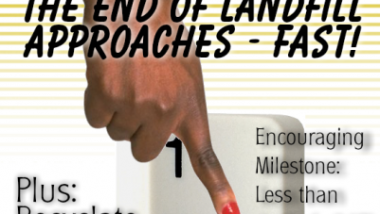Today we have a guest post on the national electronic duty of care EDoc scheme , from our new author, Graham Whistance, and we make no apologies for once again pointing out the tardiness of the waste industry in general to adopt IT advances that are commonplace in other industries.
Back in 2008, we said here on this blog that “many small to mid-size waste management companies, ….. are hindered by something as simple as their software”, and nothing has changed, 5 years later!
There is an ever more pressing need for a big push toward modernization, as anyone will know who has cause to work with waste industry records across different industry companies.
Time and again, one finds each business using unique and ad-hoc in-house devised formats, which, by their lack of common standards, very much devalue the usefulness of the data. Some waste management companies have not yet adopted computerised systems and are even now (2013) still using paper records.
 We understand that this is particularly acute in the area that Graham writes about below, but action is being taken:
We understand that this is particularly acute in the area that Graham writes about below, but action is being taken:
Environment Agency (EA) National Electronic Duty of Care Programme (EDoc)
The Environment Agency (EA) has launched the National Electronic Duty of care programme (EDoc), due to roll out in 2014. It is set to modernise the way waste data is collected in the UK, moving the industry away from its antiquated paper-based system.
Considering that the waste industry has both an ethical and legal obligation to be as environmentally friendly as possible, the fact that at any one time, the industry has 50 million sheets of paper on file is staggering.
Waste companies are legally obliged to keep hold of their waste transfer notes, or WTNs, for two years in case they need to prove their legal compliance to the EA.
The EDoc programme is set to change all this, setting a precedent for an industry that has allowed itself to technologically lag behind. It will move WTNs onto an online system to monitor the waste journey from production and collection to transportation, treatment, and disposal. This will not only make the industry greener but also more streamlined, more efficient, and more transparent.
All in all there is little to criticise. The programme is absolutely necessary, and it doesn't dictate the scope too tightly, allowing companies to have the space to adapt and innovate. It's a very positive move forward for the industry.
But considering that it won't roll out until 2014, the fact that each year the industry produces 23 million WTNs, waiting for EDoc isn't necessarily the best move. Working in the mobile phone app industry, I see the benefits of companies moving towards a digital, cloud-based system every day.
This may sound far-fetched, but I'd go so far as to suggest that the waste industry could save around £12 million a year if they scrapped paperwork altogether and went mobile.
This is based on £2.3m on paper (roughly 10p per page), £8m on the time spent on administration, and another £2m to allow for 10% in possible inputting errors.
Companies wanting to gain some real competitive advantage in the waste industry should act now rather than wait for EDoc to do it for them. Going paper-free and inputting WTNs on mobile devices not only saves an enormous amount of money but will also improve these businesses and crucially will contribute meaningfully to the environment.
 Graham Whistance is the developer of mobile workforce management software, MyMobileWorkers which has been widely adopted in the waste sector.
Graham Whistance is the developer of mobile workforce management software, MyMobileWorkers which has been widely adopted in the waste sector.
Graham is a member of the Environment Agency Business Advisory Group for the EDoc project.





You need to be a part of a contest for one of the greatest websites on the internet. I’m going to recommend this site!